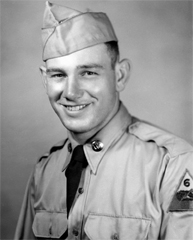

Below is the type of military write-up we want to use in the Manning Veterans' history book.
The biography just above is OK but below you find out more about the Veteran and visual details from more pictures.
Slowly we are collecting information from Veterans. Recently Sally Hodne visited with Meryl Kerkhoff about his service in Korea. Sally also borrowed a copy of a 1995 college report made by Meryl's grandson, Jared Kerkhoff, and combined some of his interview with her interview.
I'm sure children, grandchildren, or other relatives have had school projects where they interviewed a Veteran in their family. Please look for these projects - a lot of useful information can be gleaned from them, and also could be used as is in the Manning Veterans' book.
Most Veterans go about their daily lives quietly and do not hold their military service over the heads of those of us who did not serve. They even tolerate those citizens who do not stand when the Colors and Veterans pass by in a parade. These Veterans fought for everyone's rights - even if some of those rights allow disrespect to the flag and service. Some of our Veterans saw horrible things during war and understandably many prefer to not remember or reminisce about these events. In order to better understand our freedoms we need to document our Veteran's stories and also honor their service in the Manning Veterans' history book. If you are a Veteran or family member of a Veteran please take some time and write down their memories and stories. Don't worry about TOO much information and pictures - we want as much as we can get.
While Meryl Kerkhoff's life as an auctioneer was anything but "QUIET" he has been a supporter of the Manning community and the schools; continuing his service to everyone and not asking anything in return.
MERYL KERKHOFF, KOREAN WAR VETERAN
Meryl Kerkhoff fought for almost nine months of his two years of military service on the battlefield in South Korea. He remarked that he never prayed so hard in his life as when he was there and described the fact that he came home alive as being "one lucky man."
Meryl was born on January 17, 1929, to Alphons and Frances (Bluml) Kerkhoff and grew up near Templeton, Iowa. He spent all his school days at Sacred Heart Elementary and Sacred Heart High School graduating in 1946. Meryl's memories of World War II include that the junior and senior boys were allowed to miss classes for three weeks in the fall to help pick corn. They got full credit for the classes they missed.
Meryl married Imelda Grossman on December 26, 1950. The Korean War was waging and in June 1951, he was drafted. He had to leave Imelda who was two months pregnant with their first child and go to basic training at Fort Leonard Wood, Missouri. There he was trained for eight weeks in engineering, and then was trained as a noncommissioned officer so that he could be a squad leader and instruct new trainees.
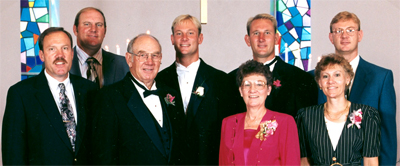
On June 4, 1952, after seeing Imelda and his new son Marty, Meryl left to fight in Korea. The trip took twenty-eight days by ship. His group left from Camp Stallman, Washington, went to the Philippines, next Yokohama, Tokyo, and then to the seaside port of Pusan, Korea. There the group boarded a train for Seoul and from there were taken to the front lines. Meryl served as a foot soldier with the Third Battalion, Second Infantry, Love Company.
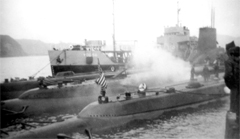
Meryl's first impression of Korea was that it was a desolate land of hills and mountains, much like our Loess hills only taller. Everything had been blown up by artillery. The villages and vegetation were in ruins.
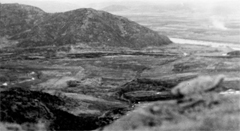
Meryl's group was divided into four sections, we'll call them 1, 2, 3, and 4. There was always one group in reserve. There would be three sections on the front line: Those in the very front, those in the middle, and those in the back. If 1, 2, and 3 were in the field, 4 would be in reserve. When 4 went out, they would take the place of 3, 3 would move up and take 2's, place, and 2 to 1. Number 1 would go into reserve until the next rotation. The men had to put in thirty-six rotations on the front before they could go home. This could usually be done in a little over a year. Because of this set-up, when you were in the front two lines you had North Korean mortars coming at you from the front and American mortars going over you from the back.
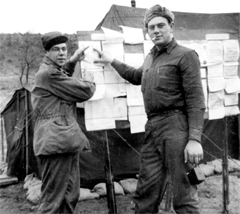
The battles were fought on hills that were named. Meryl's first assignment was "Old Baldy" next to the famous Pork Chop Hill. He also fought on Hill 281 and a hill called the "Hook." The only way to fight on these hills was by foot because if tanks tried to crawl the hills they often tipped over or ran off their tracks. The soldiers wore steel vests or bullet proof vests. When the North Koreans made progress over the hill, the U.S. and South Korean forces would push them back. The Americans would make progress, and the North Koreans would push them back. That's how the war was fought - never a big invasion. Never either side progressing.
Meryl carried an air-cooled machine gun. Two ammo carriers and a soldier carrying a tripod, on which to set the gun, were always with him. One time when Meryl was on the front line, there was an explosion right in front of his machine gun. It was so close that his helmet was blown off, and for a few seconds he thought his head was blown off also. He was very lucky that it was just the helmet.
One morning the men were called up to the front lines and told to put on their bayonets for a mission. The mission was canceled, however, by the time they were set up. Another time Meryl's luck held out was when he was ordered to go out on a patrol with six other squad leaders. They did not want to go on this patrol but left reluctantly. Two of the men were South Koreans. When they were digging their bunker, the South Koreans were standing up digging, but the Americans were lying down to dig because they were so afraid. While the Americans were out on patrol, the bunker was blown up and the two South Koreans killed. As they came back to the bunker an officer turned their faces away from the bunker so they couldn't see the gruesome scene.
When out in the field the soldiers slept in foxholes or bunkers. Meryl fought in the monsoon rains, and he fought in the cold of winter. The soldiers wore thermal boots, but their feet still got extremely cold. Meryl said, however, that he was lucky to be there in the winter of 1952 because the winters of 1951 and 1953 were much colder. The front line was considered a stationary front line which meant no one was allowed off the line unless they were shot or injured. Many soldiers wanted to quit, but they were forced to fight. If they backed off the line or refused to move forward, they were told they would be shot. Many of the front line soldiers were negative and bitter. It was very difficult to find anything positive to rally around.
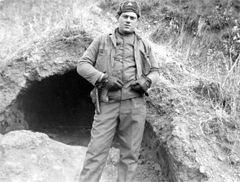
Meryl did become good friends with his ammo carriers, Jeff Goss from Crossville, Tennessee, Howard Silverstein of New York, and the tripod carrier, a Korean soldier, Sun Ho Tek. One night when they were out in the field, Meryl woke up about 2 a.m. and Jeff had decided to take Meryl's gun apart and clean it. The problem was that it was too dark to see to put it back together. Of course Meryl was quite alarmed with this, but when there was enough daylight they put it back together. They were just thankful that there were no raids that night.
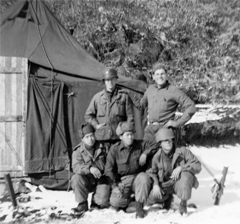
Norbert Sturm from Carroll County was a friend of Meryl's, and when he found out they were in the same vicinity, Norbert convinced his commanding officer to let him use a jeep and go out to look up Meryl. Meryl was out in the field, and when Norbert got about half way to the front where he could reach Meryl, he decided he wasn't going to take the chance. He turned around and went back. There were several other Carroll County men who were in Korea at that time. They all got back to Iowa safely.
Meryl served his thirty-six rotations in just eight months and three weeks; however, to rotate out of the zone, he and two other men had to ride a two and one-half ton truck right up to the combat line. They did lots of praying that they would be lucky one more time. Meryl was discharged to Incheon, went through Seoul, then to Sasebo, Japan, back to Tokyo and then to Seattle by boat. He jokingly says he spent forty-five days on a ship and wasn't even in the Navy. He went by train from Seattle to Omaha, and was, at last, back in Iowa. Meryl was honorably discharged on April 25, 1953, with the rank of corporal. Rank had been frozen while he was in Korea so the men couldn't advance.
After his time in the service, Meryl started farming south of Manning and spent two nights a week attending the G.I. school for farm training. When he had to pick a subject, he chose auctioneering. One of his good friends told him, "he'd never make it" as an auctioneer. Meryl did "make it" and celebrated fifty-one years of auctioneering and his eightieth birthday on January 17, 2009.
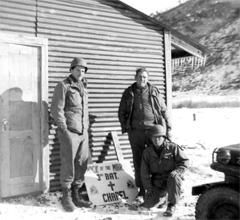
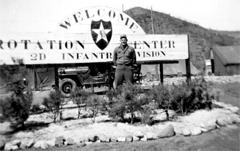
In Memory of Meryl Franklin Kerkhoff
Meryl Franklin, son of Alphons M. and Frances H. (Bluml) Kerkhoff, was born January 17, 1929, at home on the farm in rural Templeton, Iowa. He attended school in Templeton, graduating in 1946 from Sacred Heart High School. Meryl farmed with his family and then served in the United States Army from 1951-1953. He was stationed in Korea as a machine gunner with the 2nd Infantry Division.
On December 26, 1950, Meryl was united in marriage with Imelda Grossman at St. Mary's Catholic Church in Willey. They made their home on a farm 3 3/4 miles south of Manning and seven children were born to this union. Meryl resumed farming after his military discharge. In 1957 he attended the Reisch College of Auctioneering in Mason City, and he then worked as an auctioneer and real estate agent in addition to farming. Meryl continued to help his sons Marty and Dan with their farming operations over the years. He was the Master Distiller of Templeton Rye Whiskey, having provided the recipe to launch commercial production.
Meryl was a member of the Veterans of Foreign Wars, American Legion, the Iowa Real Estate and Auctioneer Association and lifetime member of the Knights of Columbus. He was a member of the Sacred Heart Church in Manning. Meryl loved to spend time and play cards with his grandchildren.
For the last several months Meryl had been fighting cancer. He died at the Manning Hospital on Thursday, July 29, 2010, at the age of 81 years, 6 months and 12 days.
He is preceded in death by his parents; brother Orville Kerkhoff; brother-in-law Francis Tunink; sisters and brothers-in-law: William Thielen; Helen Thielen (Charles); Louis Grossman (Marian); and Rita Tigges.
He is survived by his wife Imelda Kerkhoff of Manning; children: Marty Kerkhoff (Debra) of Manning; Keith Kerkhoff of Manilla; Mary Bertelsen (John) of Polk City; Joel Kerkhoff of Glenwood; Ron Kerkhoff (Kim) of Hartland, Minnesota; Dan Kerkhoff (Cheryl) of Manning; Scott Kerkhoff (Teri) of Iowa City; 14 grandchildren; 3 step-grandchildren; 3 great-grandchildren: Adrianne Kerkhoff, Benjamin Kerkhoff and Cecelia Snow; siblings: Joan Tunink of Odebolt; Frank Kerkhoff (Carol) of Red Oak; David Kerkhoff (Delores) of Templeton; and Joyce Masching (Jim) of Carroll; sister-in-law Dorothy Kerkhoff of Audubon; sisters and brothers-in-law: Marie Thielen of Carroll; Robert Grossman (Lorena) of Willey; Ed Tigges of Willey; Freda Tigges (Joseph) of Dedham; Marilyn Heithoff (Wayne) of Urbandale; other relatives and friends.
Born: January 17,
1929 Death: July 29, 2010
Place of Death: Manning Regional
Healthcare Center
Occupation: Farmer, Auctioneer/Real
Estate
Services Visitation and Prayers Sunday
August 1, 2010, After 3:00 PM at Sacred Heart Church
Rosary Knights of Columbus at 4:00
p.m. Prayer Service at 7:00 PM
Funeral Services Monday August 2,
2010, 10:30 AM at Sacred Heart Church
Mass of Christian
Burial Monday, August 2, 2010, 10:30 AM Sacred Heart Church, Manning, Iowa Rev.
Robert Gralapp & Rev. Andrew Hoffman
Lector Ray Thielen
Mass Servers Robert Tank, Ryan Meier
Eucharistic Ministers Marian
Irlbeck, Ray Thielen
Gift Bearers Kenzie
& Kiley Kerkhoff, Jessica Bertelsen
Music "Ave Maria" Laurie
Stein, Vocalist
"On Eagle's Wings" "Hosea" "How Great Thou Art"
Sacred Heart Choir Pat Heithoff, Accompanist
Casket Bearers - Meryl's
Grandchildren: Jared Kerkhoff, Nick Kerkhoff, Ryan Kerkhoff, Kody Kerkhoff, Eric Bertelsen,
Blake Kerkhoff
Honorary Casket bearers - Meryl's
Grandchildren Kari Kerkhoff, Amy Snow, Jessica Bertelsen, Kenzie Kerkhoff,
Kiley Kerkhoff, Alyssa Kerkhoff, Erin Kerkhoff, Brody
Kerkhoff, Jason Ripke, Derek Ripke, Sara Ripke
Interment with Military Honors Sacred
Heart Cemetery, Manning, Iowa V.F.W. and American Legion Posts
Final Harvest
He was bound to the land
from the day of his birth
His roots anchored deep
in the fertile earth
Nurtured, sustained; by the soil he grew
And his life, like his furrows,
row straight and true.
In faith, each spring, he planted the seeds
In hope, to reap for his family's needs
With patience, he waited for
the harvest to come
To gather the fruits of his labor home.
Ever turning seasons, the years sped past
Till the final harvest came at last
Then claimed anew by beloved sod
He was gathered home to be with God
Barbara W. Weber